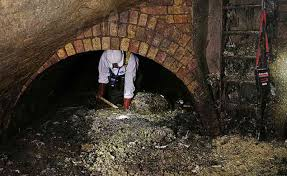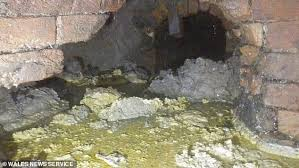A fatberg is a large clog in a sewer system that’s made up of grease and other inorganic matter like non-biodegradable items that have been flushed into the drainage system. Like home drain clogs, they grow in size over time. As debris and grease build up, more grease will be deposited. Fatbergs can be composed of everything from feminine products, nappies and wet wipes to human waste, cooking oil and other unsavoury materials. Sewage overflows are bad for the environment and contaminate water supplies.

Fatbergs are more common in big cities. In 2017, a 140-ton fatberg was discovered in the East End of London. There were some truly gruesome things found inside the fatberg such as condoms, syringes and even drugs!
While the exact causes of fatberg formation are unknown, they are often the result of a number of household activities. Cooking oil and grease can form fatbergs in sewer pipes. Additionally, personal hygiene products, including cotton buds, wet wipes, and nappies, can become entangled in them and become a part of the blockage. In fact, wet wipes and nappies can cause blockages in sewers, so it’s important to avoid flushing them down the toilet.
One of the largest fatbergs in history was found in a sewer in London. It weighed the equivalent of twelve double-decker buses, and took eight workers three weeks to remove it. You’ll need specialised tools and techniques to remove a fatberg this size from a sewer system. But if you don’t want to become a part of the fatberg problem, you can prevent it by being proactive and careful about what you flush down your drains. Get advice on a CCTV Drain Survey Windsor by visiting https://www.drainpower.co.uk/drainage-services/cctv-drain-surveys/cctv-drain-surveys-windsor/

In most cases, a fatberg is formed when items that are not meant to be flushed go down the toilet. These items include wet wipes, cotton buds, condoms, and cooking oil. Other common causes of a fatberg include food scraps, coffee grounds, and even toys that accidentally get flushed away! Fortunately, toilet paper does not contribute to fatberg formation, as it dissolves during the flushing process.
Fatbergs can be dangerous for humans as they may contain toxic substances. They also cause huge damage to the urban sewage system, creating clogs and blockages that bring the entire system to a halt. The amount of labour that is required to remove such a blockage is also incredibly costly. In fact, fatbergs can become so solidified that they can end up with a consistency similar to rock.
